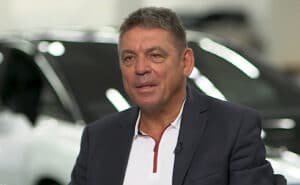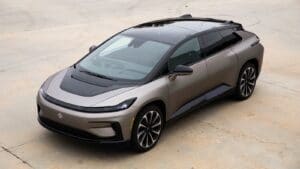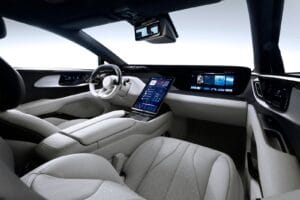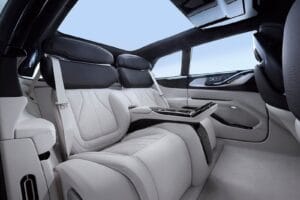
Shift the rumor about troubled EV maker Faraday Future partnering with a blank-check company to go public to the “fact” side of the ledger as it will pair with Property Solutions Acquisition Corp. in a deal worth about $3.4 billion.
It will net the company about $1 billion, which it will use to put its first vehicle, the FF 91 into production with deliveries estimated to begin next year, according to Faraday’s CEO Carson Breitfeld.
The rumblings about Faraday becoming the latest electric vehicle company to bolster its cash position through a reverse merger using a special purpose acquisition company, or SPAC, got stronger last week as future competitor Lucid Motors was linked to a deal.
(Faraday Future needs multiple products to survive, CEO admits.)
“We are excited to enter into this partnership with PSAC. This is an important milestone in our company’s transformation, one that we achieved with strong commitment from our employees, suppliers, and partners in the U.S. and China, as well as the city of Hanford, California,” Breitfeld said in a release.

The automaker has plenty of company in the now-popular SPAC market, joining the aforemented Lucid, Fisker, Canoo, Lordstown and Nikola are all electric vehicle companies that have used the reverse merger to tap new investment dollars. Even other parts of the EV universe are doing, EV charging company EVgo announcing plans to partner up with a blank-check company to secure $575 million to help fund its charging station expansion efforts.
“I am excited that this business combination will allow us to launch the class defining FF 91, building upon the founder’s original vision to help our users and shareholders take part in shaping the future of mobility.“
The company expects to have the FF 91 in production in the second quarter of 2022. Designed to compete with the Tesla Model S, Lucid Dream to start, the FF 91 will produce 1,050 horsepower and race from 0-60 mph in less than 2.4 seconds.
Additionally, zero gravity seats with the largest 60-degree reclining angles and a revolutionary user experience designed to create a mobile, connected, and luxurious third Internet living space, the company says. The company claims it has more than 14,000 reservations and expects to sell more than 400,000 vehicles in the next five years.

(More auto companies looking to get SPAC’ed.)
If the FF 91 makes it to the public, it may have taken the most arduous journey of all electric vehicles to get there. Faraday originally laid out plans to build a futuristic, 1,000-horsepower supercar, the FF Zero1, which it unveiled at CES 2016. However, by the time the 2017 show opened, the company dumped it for the FF 91, a more direct Tesla Model S competitor expected to be priced between $120,000 and $200,000 depending on features and range.
The project appeared to move quickly. Backed by Jia Yueting, a tech entrepreneur often referred to as China’s Steve Jobs, the company soon lined up, and even broke ground for, a new assembly plant at a sprawling site near Las Vegas.
Then the bottom fell out. Jia’s personal finances collapsed, and he had to back out of several automotive projects, including Faraday. A new Chinese investor failed to follow through on funding, leading to a lawsuit and concerns that the company would collapse. A number of senior executives, including co-founder Nick Sampson quit, and, soon afterwards, a large share of Faraday employees were either laid off or hit with major pay cuts.
But a deal to save the company was pulled together, Faraday raising close to $900 million from Birch Lake Fund Management, LP and Chinese videogame company The9 Limited. However, event that wasn’t enough to get the FF 91 across the finish line, or perhaps more appropriately, on to the starting grid.

Not only does it appear to want to compete with Tesla, but it’s also borrowing from its playbook, offering a pricey, high-end vehicle with an equally high price tag to help fill the coffers with cash so it can then fund the development of smaller, more affordable models like the FF 81 and FF 71, Breitfeld told TheDetroitBureau.com last year.
Faraday, which has seen $2 billion in investment during its lifetime, plans for the deal to close during the second quarter of this year. In addition to the FF 81 and FF 71, which are planned for launch in 2023 and 2024, respectively, the company is developing a Smart Last Mile Delivery vehicle to be ready in 2023, leveraging its proprietary VPA.
(Lucid Motors looking to raise big cash in SPAC merger.)
To implement a capital light business model, FF has adopted a global hybrid manufacturing strategy consisting of its refurbished manufacturing facility in Hanford, California and collaboration with a leading contract manufacturing partner in South Korea. The company is exploring the possibility of additional manufacturing capacity in China through a joint venture.







